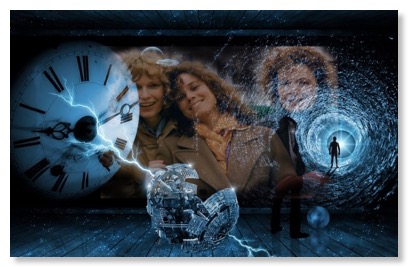Editor’s Eye: How you time travel.

One of the joys of our era is an overlooked form of time travel: re-watching a movie you haven’t seen in a year or two. The same dependable sights and sounds replay before your eyes and ears. It turns out when we are engrossed in a film, our brains respond to what we see and hear in the same way they would to taking in the events in reality. Think of a work of cinema as an elaborate memory crafted by art and technology. Each time you watch the film, you re-live the “memory.” Since the movie remains unchanged, it’s a high fidelity memory indeed. The sense of your first snow day can trigger great elation when you recall it. But you won’t see it again in the way you might the opening winter scene in It’s a Wonderful Life. Movies are stabilized memories.
“The bottom line is that time travel is allowed
by the laws of physics.”
— Brian Greene
I delight in my time machine. Each autumn, I go through a pensive phase, a time of reflection. My ritual is to re-watch a handful of movies that have seen me through the years. One of my favorites, Woody Allen’s Hannah and Her Sisters, conveys the hilarious and poignant memories each time, yet previously missed nuances do emerge. Since the movie hasn’t changed, I can notice how I have. I’m watching with new conditioning. In other words, re-watching brings into relief the fact that what I see and how I see it changes over the years. When I first saw Hannah in the theater in 1986, I was a young fellow full of ambition, hungry to conquer the world. It’s no wonder I interpreted Mickey’s (Woody Allen) identity crisis as a form of wanting to master religion in an oddly heroic fashion. Over the years, this plot element retained its hilarity, but it also revealed a seriousness about questioning one’s values as midlife erodes the certainties dreamt in youth. I once characterized Hannah, played by Mia Farrow, as frail — now I see that she exerts great will to hold the family together as it bumbles through emotional land mines. Allen’s abiding love for the jazz and swing music that weave throughout the film renews itself with each screening, and the songs somehow feel more and more like... mine.
Perhaps the most astonishing aspect of time travel through watching Hannah and Her Sisters is how my laughter during the movie has grown from an intellectual pleasure to include a more encompassing affection for humanity. Hannah is a mature comedy of ideas that ventures into the struggle of quintessential New Yorkers to feel at home in themselves. I’ll be watching it again with students in a few weeks, and I’m eager to see how the trip goes this time around.
by Eric Pomert signup
